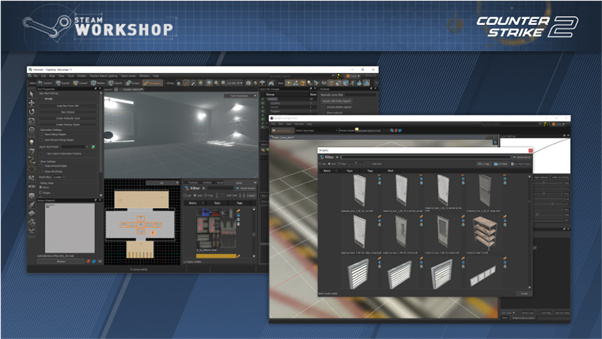
Fans of a multitude of Steam games over the years will have become all too familiar with the Steam Workshop launched way back in 2011, it’s one of the few major platforms that allow modding support directly through the games client and a way to share these third-party mods or maps with the community in a very direct and easy way. Whilst there have been huge success stories with use of the workshop, there have been quite a few infamous cases of abuse within the workshop too – we’ll take a look at the ups and downs of the Steam Workshop for the biggest cases that have went well, or those that have failed.
DOTA 2’s Arcade Games – As one of the most popular esports titles in the world, DOTA 2 draws a significant audience to the core game, one that many enjoy playing for grinding the ranked ladders and watching during the major events as the market to bet on dota2 has continued to grow too – but eventually players will always seek out something new to bring a fresh spin to the game they love.
The workshop provided this with the DOTA 2 arcade games, some were hugely successful like the auto-chess game mode which was even made an official mode in its competitor, League of Legends, with Teamfight Tactics. But not all were so harmless, huge monetization of the arcade game market eventually led Valve to step-in to story predatory pay-to-win arcade games from thriving and bringing an end to many of the favorite arcade games.
Whilst some will argue this was a poor change, many are on the opposite side of the fence and have thanked Valve for acting – whilst the workshop is still active for the game, many of the popular arcade game servers have since shut down without the possibility to make money.
(Image from IGN.com)
Introduction of Custom Maps – Fans of the Counter-Strike series will be all too familiar with custom maps, once downloaded directly from a server hosting them, they’re now shared through the workshop. Most are familiar with aim trainers like aim_botz, and other similar maps, but many may not realize that some of the most competitive maps have been spawned from the workshop too.
Maps like de_cache were originally custom maps for Counter-Strike: Source, eventually re-worked and launched on the workshop for feedback, the popularity helped bring them into the active map pool and be part of some of the most liked maps of all time too, and the same being true with other fan favorites from previous games like de_tuscan which saw its remake featured on the workshop too.
Custom skins and stickers – One of the big driving forces behind the success of Valves’ biggest titles in DOTA2 and CS2 is within the cosmetics market, custom skins and stickers that are made for the game and for many hold a huge value. Many players consider these as being a large part of the reason why the games have managed to remain so successful, with a separate market just for skins developing by themselves, and the workshop is home to showcase those that may be released.
Whilst this has been extremely lucrative for both Valve and the skin makers, it isn’t always smooth sailing – perhaps the most well-known case of this was for the M4A4 Howl originally released in CS:GO, after discovering the artwork was stolen, Valve were forced to change the skin and the classification of the skin leading to prices soaring overnight. Learning their lesson from this, other skins that have faced similar treatment have stealthily been updated but showing one of the few downsides to the workshop too with some looking to make a fast bit of cash.
Overall, the workshop has been a fantastic tool for Steam and something that will continue to provide countless opportunities moving forward and shows other developers just how useful a tool like this can be if developed and introduced properly into the game.